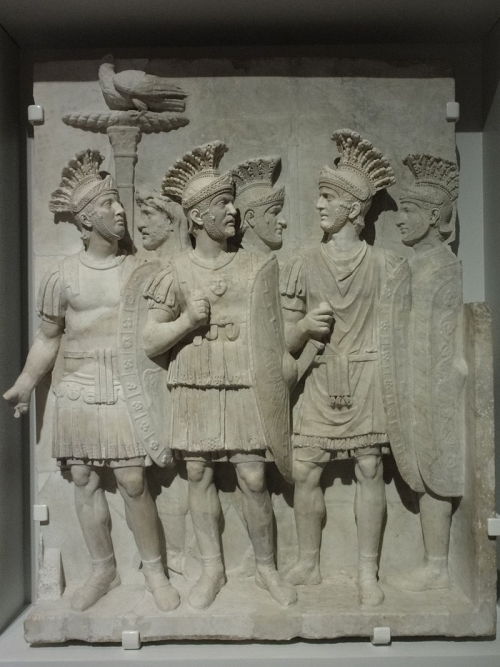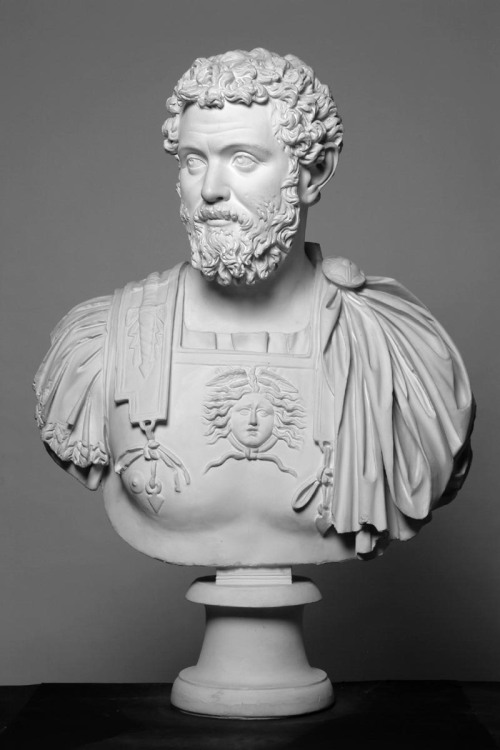peashooter85:An Empire for SaleThe Roman Emperor Commodus was not a good emperor, being known for a
peashooter85:An Empire for SaleThe Roman Emperor Commodus was not a good emperor, being known for a legacy of megalomania, lunacy, and tyranny. Commodus’ reign came to an end in 192 AD when he was strangled to death as part of a conspiracy by his maid and the Praetorian Guard, the personal bodyguard of the Emperor. As part of the conspiracy, the Praetorian’s installed a Roman Senator named Pertinax as Emperor under an agreement that he would pay the Praetorians a large sum of money. Under Roman law, the Emperor had to the confirmed by the Senate, so the Praetorians merely forced the Senate to confirm Pertinax with the threat of violence.The Praetorians thought that being the power behind the throne would be just ace. Soon the Praetorian Guards fell into sloth and drunkeness, it’s members wanting to not only wield the power of an emperor but live like emperors as well. The only problem was that Pertinax reneged on his deal, only paying a portion of the agreed upon sum. In addition Pertinax tried to enforce military discipline upon the Praetorians, trying to reign them in and transform them from being overprivileged pampered slobs back into elite soldiers. The Praetorians didn’t take too kindly to this and thus murdered him on March 28th, 193 AD, a mere three months after installing him as emperor.After the murder of Pertinax, the Praetorians announced that they would host an auction for the throne. Learning from the mistakes of the past, the Praetorians hoped to milk the empire for all it was worth and demand cash up front. Rome’s wealthiest and most powerful citizens gathered to participate in the auction in hopes of buying the empire. After several rounds a bidding war developed between Titus Flavius Claudius Sulpicianus, the Prefect of Rome, and Didius Julianus, the Proconsul of Africa. Sulpicianus bid 20,000 sesterces (silver coins) to every Praetorian Guard. Julianus however won the bid by offering 25,000 sesterces, an enormous sum that Sulpicianus could not match. The guards saluted him and declared him emperor. They then forced the Roman Senate to confirm him as emperor at sword point.Unfortunately for Didius Julianus, his time as emperor would be very short. The people of Rome were resentful of having an emperor ascend to power through pure greed. Whenever he made a public appearance people would greet him with insults, jeers, and obscenities while pelting him with stones and rotten vegetables. Worse yet, his provincial governors refused to recognize him as a legitimate Emperor of Rome and refused to carry out his orders. This was especially bad because the Roman governors not only controlled the legions and auxiliaries, an army which numbered in the hundreds of thousands, but controlled the infrastructure and day to day governing aparatus of the empire. Julianus, at best, commanded the Praetorians, numbering around 5,000 men at most, by then a force of drunken and unruly men, and the city cohorts or Rome, a police force numbering around 5,000. The people of Rome didn’t take him seriously, the governors didn’t take him seriously, the Senate was resentful of his rule, and his power didn’t stretch far beyond his palace. Poor Didius Julianus was emperor of not much of anything.Immediately Roman Governors began to march on Rome to oust Julianus. The closest and also the most powerful was the Governor Pannonia Septimus Severus. Julianus sent an envoy to Severus in hopes of negotiating a power sharing deal, but Severus refused and the senators sent to negotiate defected to his side. Julianus then sent a small force of Praetorians to slow down or halt the advance, but Severus’ army easily swept away the small force. Upon reaching Rome, Severus called for the heads of the Praetorian leaders responsible for the murder of Pertinax, and promised to spare everyone else, recognizing that they were mere innocent bystanders or pawns of the Praetorians who acted under the threat of harm. The Praetorians quickly produced the responsible men, who were immediately executed, and Rome was surrendered to Severus without a fight.Didius Julianus was declared an enemy of the state by the Senate. He was executed by one of his palace guards, his reign lasting 66 days. Septimus Severus was recognized as Emperor of Rome by the Senate. A civil war would erupt between Severus and some provincial governors for control of the empire. Severus would remain on top, thus founding the Severan Dynasty. -- source link
Tumblr Blog : peashooter85.tumblr.com


